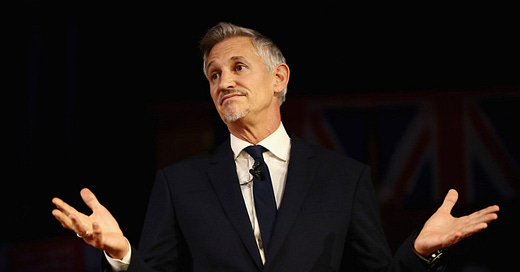I'm just trying to rid the world of all these fevered egos that are tainting our collective unconscious... and making us pay a higher psychic price than we imagine.
-Bill Hicks
Last week, News From Uncibal got its 500th subscriber. It is therefore fitting that I should return to the subject which got the whole thing started: Gary Lineker, and his semiotic significance. Lineker ought to be an obscure figure. But he is central to the national debate in Britain, and it is important to make clear why, as he symbolises much of what is wrong with the way things are going - not just across British society, but across the Western world.
How does one explain Gary Lineker to a non-British reader? Lineker is a former professional footballer with a natural poacher’s instinct for goals, who won the ‘golden boot’ at the 1986 World Cup finals and was for a time probably English football’s leading light. He was also famously ‘nice’, having never recieved a yellow card in his entire career, and he gave off a wholesome, schoolboyish vibe, leavened by a slightly impish charm. After his playing career was over he made a living as the face of Walker’s crisps, a snack company, appearing in a long-running series of humorous TV adverts, and he eventually became the presenter of the Grand Dame of BBC sports coverage, Match of the Day (MOTD).
MOTD, like everything on broadcast television, is a shadow of what it once was, but it still has totemic significance in the national psyche, being screened late on a Saturday night and featuring highlights of the day’s football punctuated by chunks of easily digestible ‘punditry’. The person who presents the programme therefore ends up occupying a position a bit like the captain of the English cricket team or a prominent soap star; people feel as though it matters in some profound sense who has the job.
Lineker is by some distance the most highly paid figure who works for the BBC (though he is technically not an employee), earning something like £1.3 million a year - which he gets basically for sitting down once a week to ask easy questions to former footballers with respect to some football matches that happened that day (and also cackling and braying along to Alan Shearer and Micah Richards’ ‘jokes’ - I use the term loosely - on the appalling Match of the Day Top Ten). And this is where the trouble, for most people, begins.
I have no problem, for the record, with people earning whatever amount of salary the market considers to be appropriate - I am not the kind of person to get excited by the issue of fat-cattery in the round. But the important thing to understand about Lineker’s salary is that it is not the product of market forces, because the BBC is not subject to those forces (except indirectly in the sense that fewer and fewer people choose to watch BBC TV programmes). Indeed, every single household in the UK which owns a colour TV must - at pain of criminal sanction - pay the BBC £159 a year for the privilege if they intend to watch, or record, broadcast transmissions. It is no exaggeration indeed to say that the great majority of the population of the country is forced by the criminal law to pay a portion of Lineker’s salary - something about which they have absolutely no choice (unless they do not wish to have a TV at all), no control over, and no recourse to appeal.
As Kundera once put it, sometimes in life it is the most banal observations that shock us the most, and this is one such instance. Unelected bureaucrats at a State-funded media company have mandated that a former footballer be paid vast sums of money at public expense in order to front a TV programme that individual members of the public may or may not even watch, with each of them being forced to comply on the basis that if they do not, they will have to pay a fine of up to £1,000 (or be imprisoned).
And we have the nerve to call Tajikistan, Myanmar and Eritrea corrupt.
This should of course be scandal enough, although when it comes to the TV license - as with the NHS - the British population suffers from a strange variation on Stockolm Syndrome, in which great outrages are forgiven and indeed welcomed on the basis that they are ‘our’ great outrages and we all have fluffy and sentimental associations with them. And if Lineker was able to restrain himself to simply reading out football scores and remarking on how good player x, y or z is at finding ‘pockets of space’ and how a particular tackle ought to have been a ‘stonewall penalty’, he would fly completely below the radar and could enjoy his sinecure in peace until shuffled off the mortal coil.
But of course he is on Twitter (or X, if you prefer). And, like anybody who ends up on Twitter, his brain has been well and truly borked. But it has been borked in a certain, illustrative way. And this has allowed him to take on a role as a public figure whose views on The Current Thing are taken to be of great import by significant chunks of the ‘new elite’. This, naturally, draws the ire of people who tend to disagree with his views about The Current Thing. But it also gives us a window onto a particular character type, very common among the media classes, and highly detrimental to sensible public discourse.
Keen readers may choose to take a break for a moment and listen to Gary Lineker’s 1990 appearance on the BBC radio interview programme, Desert Island Discs. For those unfamiliar with the format, Desert Island Discs involves a public figure of some kind being interviewed by a friendly journalist and being asked to choose his or her favourite eight records of all time, and commenting on what they signify. In Gary Lineker’s case, the records in question, instructively, are about the most anodyne that can be imagined (the most outre is Booker T & the MGs’ ‘Soul Limbo’, for heaven’s sake). But the music isn’t very important here. What is important is the interview itself, which reveals very starkly that Lineker is not the kind of person whose views it is important to take seriously about, well, anything other than football. Because, basically, he just isn’t very bright.
But the thing is, he is bright enough. Reading through his timeline on Twitter, one is struck by the same observation, time and again: this is a person who is not really capable of rigorous thought, but is intelligent enough to identify the right thing to say at any given moment in order to appeal maximally to bien pensant Twitterati with regard to the issue of the day. Here he is, for instance, on Nigel Farage, at the time of the Brexit referendum:
And here he is having a go at Boris Johnson after the English national football team made it to the World Cup semi-finals:
Here he is on the removal of the Edward Colston statue during BLM protests in Bristol:
On Covid school closures:
On Donald Trump:
On gun control in the USA:
And finally on Suella Braverman, who spoke recently to condemn mass marches taking place in London in support of Hamas:
Notice how finely tuned are his antennae. How he casts around for exactly the right line to tack with respect to whatever item is on the news agenda, to discern opinion amongst the James O’Briens and Alastair Campbells of the world, and to chime in with an observation accordingly. This is not a man who forms opinions; it is a man who imbibes them from people who he thinks to be educated and intelligent - the clever people he follows on X - and then simply repackages them as his own. He spouts platitudes, but they are finely distilled platitudes - precisely the right kind of platitudes to garner ‘likes’ and retweets, and generate an ever-growing following. His brain, I repeat, has been borked, and now it functions in an almost purely Girardian way, as a kind of relentless pursuer of mimetic status via social media.
What we have in Lineker then, is a particular spectacle, unique I think to our cultural moment, in which a man who has no discernible applicable talent when it comes to political affairs, and is not really capable of forming independent views, let alone critical analysis, is given a platform by dint of the fact that he has been selected for a role by unappointed bureaucrats, from which the electorate cannot eject him. And he uses this essentially to signal his own adherence to the high-status causes of the day, and thereby cement his own position as a kind of public defender (or launderer) of the views of the higher echelons of society. People like this have presumably always existed, but our age is characterised by their prominence - and indeed their centrality in the public square. And Lineker is in this way highly representative of the Vanity Fair-like tenor of public life in the 2020s, with its apparent lionisation of hypocrisy and superficiality and a concrrent debasement of our public life.
This is in itself obviously to our vast detriment. And this is not even to speak of the demoralising effect it has on a population to go through life having to know what people like Gary Lineker think - to have it printed on the front of newspapers and talked about on the radio and otherwise insinuated into one’s awareness despite the fact that it is inevitably ill-thought through, bland and obvious. That cannot but have negative consequences for our ‘lifeworld’, in the same way that being made to eat nothing but Walker’s crisps every day would eventually have serious consequences for one’s endocrine system.
But the rot goes much deeper than that. Because, of course, the most profound problem concerning the Gary Lineker phenomenon is that he represents, in microcosm, what is going on inside most people’s heads nowadays. Something about the incentive structure of the internet, and the innate frailties of the human character, combines to turn us all into mini-Gary Linekers much of the time: slovenly dilettantes, knowing very little about very much at all, imbibing our views magpie-like from whatever online loudmouth happens to grab our attention, and convincing ourselves that our opinions are worth airing and taking seriously. The result is a peculiar mixture of breeziness and fanaticism: everybody utterly convinced that they are right and that anybody who disagrees is both wrong and wicked, in inverse proportion to how much they actually knows (or really care, deep down inside) about the issues involved.
We are not as bad as Gary Lineker, because we do not behave in the main as if it is holy writ that we should be lavishly funded by a hypothecated tax in order to have a platform to air our oafish views. But we are infected by a repulsive and self-aggrandising Linekerishness all the same. Where we go from here is anyone’s guess; what does government look like when the population is increasingly comprised of slovenly dilettantes, as I earlier called us, who are incapable of reasoning and know almost nothing about the world but are utterly convinced that they are right about absolutely everything? One thing at least is for sure - we are on our way to finding out.












Thanks David. The problem isn’t Gary Lineker but thousands of Garys in all our institutions and in public who regurgitate the current thing and get quite sniffy when you don’t. I am a little despairing but if elites start to change I am sure they will too.. after all it will be the new current thing...just maybe not in my lifetime.
👏🏻 so deliciously accurate
I like the term 'midwit' - as Crows2 says - there are thousands of them tripping up our everyday lives - the sort who know what the 'rules' are, but could not tell you why they insist upon them or what the rationale for them is; they enjoy having any kind of miniscule authority conferred by a job or collective hysteria because they have very little brain with which to effect any sort of self-determination, let alone command natural authority in any situation. More government = more midwits pushing us around. This to me is the most infuriating aspect of the socialist normality: having someone more stupid than you, telling you what to to do.